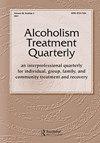A Perspective from the Field: How Can We Empower the Next Generation of Physician to Heal the Opioid Epidemic?
IF 0.9
Q4 SUBSTANCE ABUSE
引用次数: 1
Abstract
ABSTRACT Despite the continued emphasis on prescription opioids in the media and rise in substance use seen during the COVID-19 pandemic, medical school graduates today are unprepared to turn the tide on the opioid epidemic. In this paper, we review the current state of these topics in undergraduate medical education and explore what an educationally driven, forward-thinking approach to “healing” problematic substance use in our society might entail. These initiatives are discussed with the ultimate purpose of detailing how the education of future clinicians is necessary to improve our outcomes with the epidemic. We offer four educational initiatives relating to (1) comprehensive pain management, (2) developing a natural history of SUD by uniting psychiatric and neurological perspectives (3) providing patient exposure and training opportunities (4) enhancing and standardizing care through evidence-based medicine. This perspective is contextualized with a brief discussion of the national climate and societal factors that act inseparably on the present crisis. In focusing our efforts on the next generation of physicians, we hope to reform and improve the practices of future providers and begin to elicit meaningful change.从现场的角度看:我们如何赋予下一代医生治疗阿片类药物流行病的能力?
尽管媒体持续强调处方阿片类药物,并且在COVID-19大流行期间药物使用有所增加,但今天的医学院毕业生尚未准备好扭转阿片类药物流行的趋势。在本文中,我们回顾了本科医学教育中这些主题的现状,并探讨了教育驱动的、前瞻性的方法来“治疗”我们社会中有问题的物质使用可能需要的。讨论这些举措的最终目的是详细说明未来临床医生的教育如何对改善我们应对这一流行病的结果是必要的。我们提供以下四项教育计划:(1)全面的疼痛管理;(2)通过结合精神病学和神经学的观点来发展SUD的自然史;(3)提供患者接触和培训机会;(4)通过循证医学加强和规范护理。这一观点与对当前危机不可分割地起作用的国家气候和社会因素的简要讨论相结合。我们把精力集中在下一代医生身上,希望改革和改善未来医疗服务提供者的做法,并开始引发有意义的变化。
本文章由计算机程序翻译,如有差异,请以英文原文为准。
求助全文
约1分钟内获得全文
求助全文
来源期刊

Alcoholism Treatment Quarterly
SUBSTANCE ABUSE-
CiteScore
1.60
自引率
11.10%
发文量
31
期刊介绍:
Alcoholism Treatment Quarterly is an exciting professional journal for clinicians working with persons who are alcoholic and their families. Designed to bridge the gap between research journals and information for the general public, it addresses the specific concerns of professional alcoholism counselors, social workers, psychologists, physicians, clergy, nurses, employee assistance professionals, and others who provide direct services to persons who are alcoholic. The journal features articles specifically related to the treatment of alcoholism, highlighting new and innovative approaches to care, describing clinical problems and solutions, and detailing practical, unique approaches to intervention and therapy.
 求助内容:
求助内容: 应助结果提醒方式:
应助结果提醒方式:


